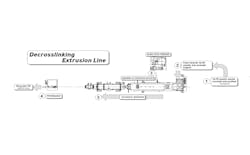Patent Report: Recycling thermoset waste
Thermoset plastic waste deemed to be unrecyclable could be a new frontier in the circular economy, in light of a new, continuous process patented by a Hong Kong company that specializes in advanced materials. According to the patent, the process produces recycled resins that have characteristics similar to virgin materials.
“Thermoplastic resins can be fluidized by heating so that they can be remolded and reused as raw materials for further production. On the contrary, thermoset wastes, which contribute to nearly half of all plastic wastes, are impossible to recycle,” the Nano and Advanced Materials Institute Ltd. states in its patent. “The most challenging point of recycling thermoset wastes is that they cannot be fluidized through conventional heating methods, due to the dense structure of their three-dimensional network.”
To overcome these challenges, the company proposes a process that uses a combination of pressure, heat and a supercritical solvent to de-crosslink thermosets, such as cross-linked polyethylene (XLPE) and XLPE foam, and phenolic or epoxy resins. To begin the process, recyclers crush or chop up thermoset waste and clean it with a cleaning agent and the use of filtration; then, they feed it into an extruder. Using temperatures of up to around 750 degrees Fahrenheit and extrusion pressures of up to 150 bar, the waste can be recycled, the patent says.
“[The] crosslinking structure between macromolecules in the thermoset plastic waste is broken down to obtain de-crosslinked thermoset waste by the supercritical solvent so that the de-crosslinked thermoset waste is continuously extruded out from the extruder,” the patent states.
A single-screw extruder can perform the process, without need of a second extruder. In some cases, the material spends less than 5 minutes in the extruder before it is entirely broken down. Faster screw speeds ensure shorter dwell times, and the patent states, “decrosslinking efficiency is improved when the extrusion temperature and pressure make the liquid solvent achieve the supercritical condition.”
The patent characterizes the process as a harmless and effective strategy suitable for mass recycling, unlike previous approaches that have proved expensive or dangerous to the environment. In addition, previous processes have required a batch process, in which a certain amount of waste and solvents are fed into a tightly sealed reactor, then collected as a batch. But, the process states, “this non-continuous process is time-consuming” and difficult to scale up.
Resins produced by the process can be returned to the manufacturing process. “The pelletized thermoset plastic waste is reused as raw materials to replace the same virgin plastics for manufacturing.” the patent says.
Patent 10,774,193; issued Sept. 15
